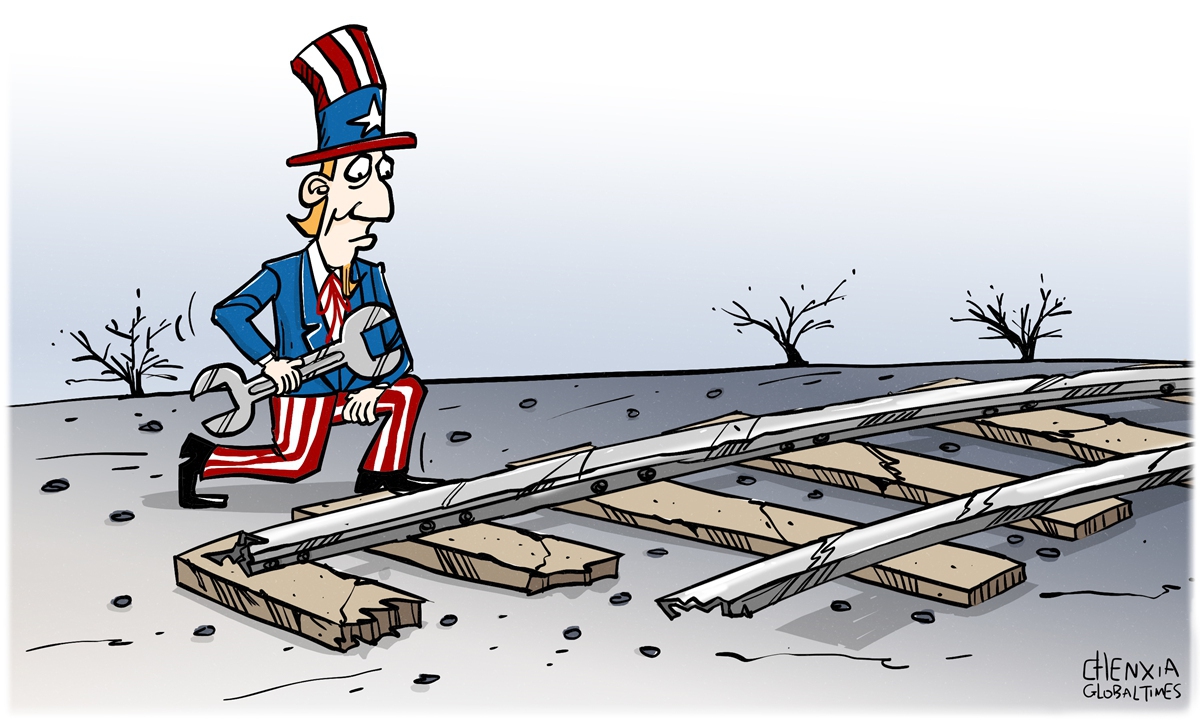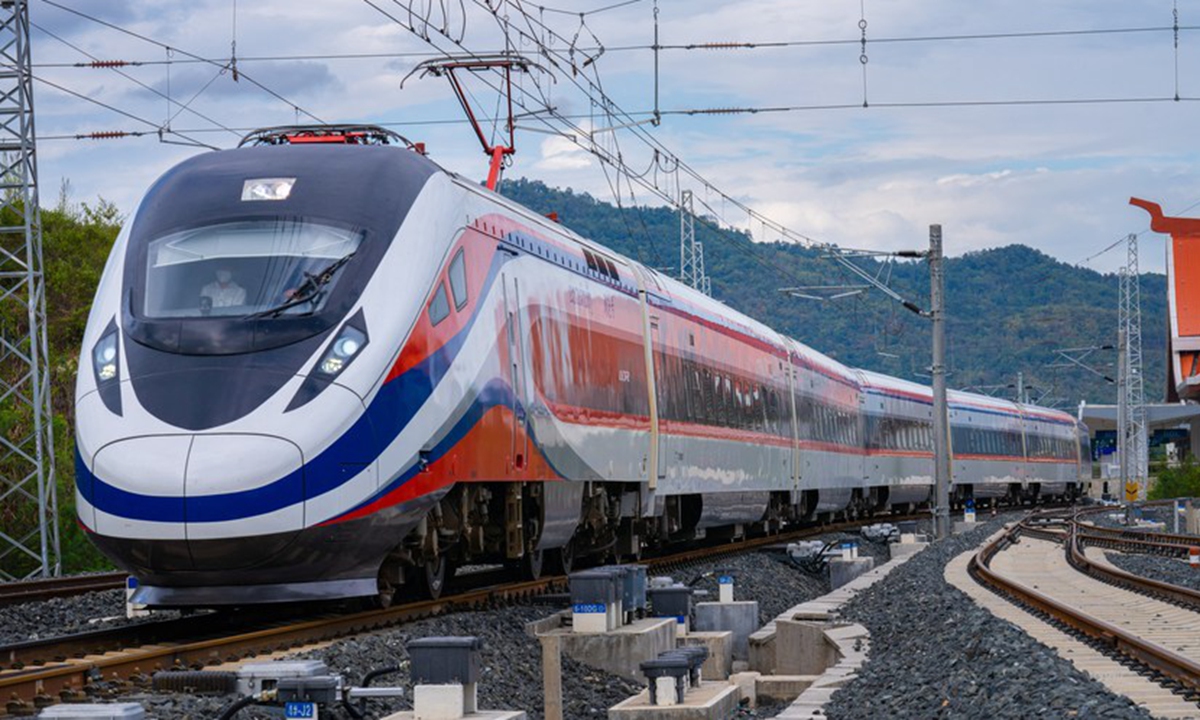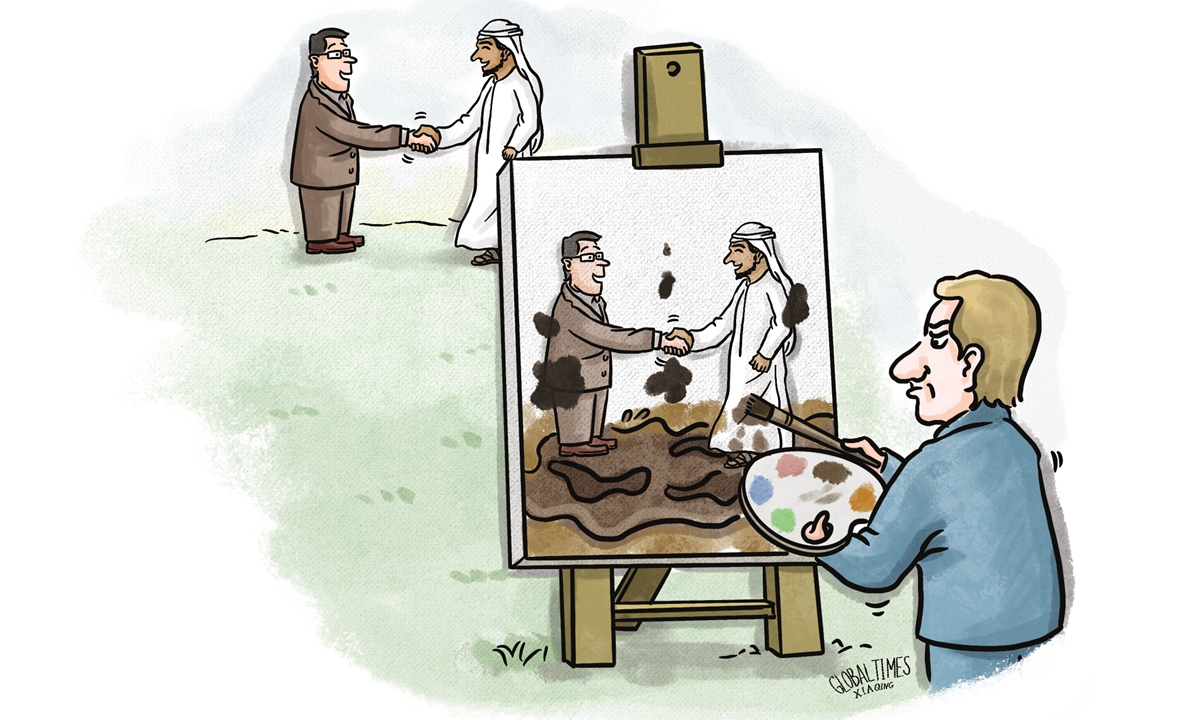US railway plan in Middle East will be another case of 'much said, little done': Chinese experts

Illustration: Chen Xia/GT
As the US announced its Middle East railway plan during the Group of 20 (G20) Summit over the weekend in India, Chinese experts expressed doubts about its credibility and feasibility, saying that it is not the first time for Washington to make empty pledges to various countries and regions.The experts noted that the true purpose of the Biden administration is trying to "isolate China" in the Middle East, a region where Chinese cooperation with the region has constantly gained momentum in recent years.
The comment followed an announcement by US President Joe Biden and India regarding a multinational railway and port deal linking the Middle East and South Asia. The announcement came on Saturday on the sidelines of the G20 Summit.
Biden said it was a "real big deal" that would bridge ports across two continents and lead to a "more stable, more prosperous and integrated Middle East," according to a Reuters report.
The idea of the rail and port network initially emerged at the I2U2 Business Forum, launched in 2021 by the US, India, Israel and the UAE to discuss infrastructure projects in the Middle East. Saudi Arabia joined the discussions later.
Zhou Rong, a senior researcher at the Chongyang Institute for Financial Studies at Renmin University of China, told the Global Times on Saturday that the US lacks both the genuine intention and the capability to follow through on its pledge to build up the transportation network in the Middle East.
"It is not the first time that the US has been involved in a 'much said, little done' scenario," Zhou said.
During the Obama administration, then US secretary of state Hillary Clinton announced that the US would sponsor a "New Silk Road" that would emerge from Afghanistan to link the country with its neighbors to increase its economic potential, but the initiative never materialized.
"The Biden administration's Middle East infrastructure plan is an apparent effort to counter the China-proposed Belt and Road Initiative (BRI), which is entering its 10th year in 2023 with brought fruitful projects to partnering countries and regions. The Biden administration is again engaging in bloc politics in order to slow down China's development," Zhou said.
The recent moves by the US in the Middle East are more reactive than proactive, given China's stronger presence, Liu Zhongmin, a professor at the Middle East Studies Institute of Shanghai International Studies University, told the Global Times on Saturday.
China has been engaging with the Middle East through the BRI for years. Its peacemaker role in the Saudi-Iran detente is lauded by the international community, the countries in the region in particular, which has injected stability into the region.
In areas such as infrastructure construction, cooperation between the Gulf countries and China has advanced significantly in recent years. "It is impossible for the US to create a hedge in the short term," Liu said.
Zhou described the US plan as "more of a symbolic gesture." From a technical perspective, the US decision to focus on transport infrastructure, an area where it lacks expertise, in a bid to salvage its declining influence in the region, suggests that the highly touted plan is unlikely to be realized.
"In terms of the technology and costs of building railways, no country in the world than China has a more prominent advantage. What the Middle Eastern countries want from the US is not just a railway, but also security. However, the US has neither provided nor been able to bring security to the region; instead, it has complicated the security situation there. This is the dilemma the US is facing in the Middle East," Ding Long, a professor with the Middle East Studies Institute of Shanghai International Studies University, told the Global Times.
For Middle Eastern countries that will participate in the US-led railway initiative, there is no concern that their ties with China will weaken just because of the deal, instead, they will continue maintaining close cooperation with the world's second-largest economy, Zhou said.
"In fact, the US' ability to influence its allies in the Middle East is shrinking, and Saudi Arabia and the UAE have recently joined the BRICS cooperation mechanism. I think the two countries will exercise prudence in the issue," Liu said.
"China welcomes all initiatives that can help pool synergy and promote global infrastructure development. Any calculation to advance geopolitics in the name of infrastructure development will win no support and will never succeed," a spokesperson for Chinese Foreign Ministry said in June 2022 on the US' plan to roll out a new infrastructure plan to counter the China-proposed BRI.
There are no such thing as different initiatives countering or replacing each other. The world needs more bridges to be built rather than torn down, more connectivity rather than decoupling or building fences, and mutual benefits rather than isolation and exclusion, the spokesperson said.



